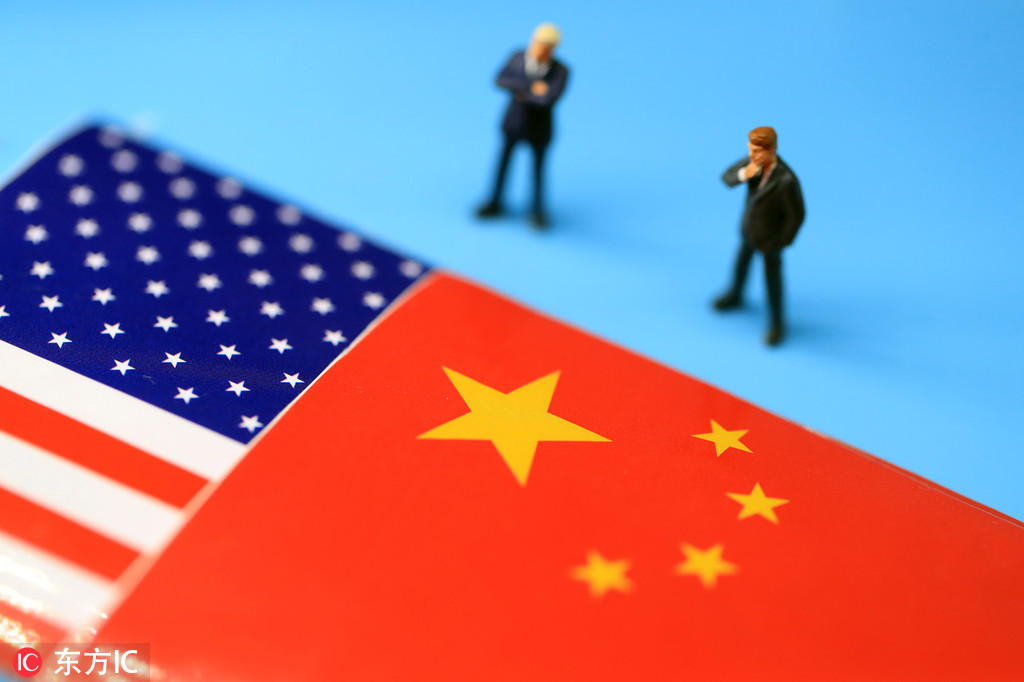
[Photo/IC]
China will impose additional tariffs ranging from 10 to 15 percent on US products, and launch an anti-monopoly probe into Google Inc, as well as other trade measures amid growing trade tensions with the United States.
An additional 15 percent tariff will be imposed on coal and liquefied natural gas imports from the US, as well as an additional 10 percent tariff on crude oil, agricultural machinery, large-displacement automobiles and pickup trucks, starting on Feb 10, the Customs Tariff Commission of the State Council said on Tuesday.
The move followed the US announcement that it would impose an additional 10 percent tariff on goods imported from China.
The Finance Ministry said the unilateral imposition of tariffs by the US seriously violates the rules of the World Trade Organization, fails to solve the US' own problems, and undermines normal economic and trade cooperation between the two countries.
"The additional tariffs announced by China will cast a shadow on a significant number of US companies. Once a US company withdraws from the Chinese market due to tariff pressures, the obstacles in terms of reestablishing a presence can be substantial," said Zhou Mi, a senior researcher at the Chinese Academy of International Trade and Economic Cooperation.
Zhou added that the attractiveness of the Chinese market remains a powerful draw for those US companies, prompting calls for Beijing and Washington to engage in open and constructive discussions and find a path forward that addresses the concerns of the businesses of both sides while upholding their respective economic interests.
US President Donald Trump told The Wall Street Journal on Monday that he planned to speak with the Chinese leadership in the next 24 hours about tariffs, and Trump also said the 10 percent planned tariffs were just "an opening salvo".
As trade tensions with the US escalate, China has filed a lawsuit with the WTO's dispute settlement mechanism to defend its legitimate rights and interests. China firmly opposes the US approach and urges the US to immediately correct its wrong practices, the Ministry of Commerce said on Tuesday.
China has also announced a group of export control policies on key minerals. The Ministry of Commerce said that since Tuesday, it has added tungsten, tellurium, bismuth, molybdenum and indium-related items to the export control list.
The Commerce Ministry also put US clothing company PVH Corp and biotechnology company Illumina Inc on its unreliable entity list. China will take corresponding measures against the two companies in accordance with relevant laws and regulations.
"The two companies violate normal market trading principles, interrupt normal transactions with Chinese enterprises, take discriminatory measures against Chinese companies and seriously damage the legitimate rights and interests of Chinese firms," the ministry said in a statement.
The State Administration for Market Regulation, China's top market regulator, said on Tuesday that it has initiated an investigation into US tech giant Google Inc for suspected violations of China's Anti-Monopoly Law.
Luo Zhiheng, chief economist at Yuekai Securities, said China should resort to effective countermeasures against any tariff threats by the White House, while optimizing domestic policies and anchoring market expectations.
"Based on the experiences gained during the first Trump administration, China can utilize measures such as imposing additional tariffs and export controls to counter trade threats from the US," Luo said.
He added that China should continue to broaden the list of sanctioned goods and entities, and increase Beijing's negotiation leverage with Washington.
Given heightened global uncertainties, China should scale up the intensity of its fiscal and monetary policies, actively expand domestic demand to counter any potential downturns in external demand, and steadily push forward high-level opening-up, expand networks with trade partners and diversify its trade portfolios, Luo said.
Contact the writers at zhuwenqian@chinadaily.com.cn